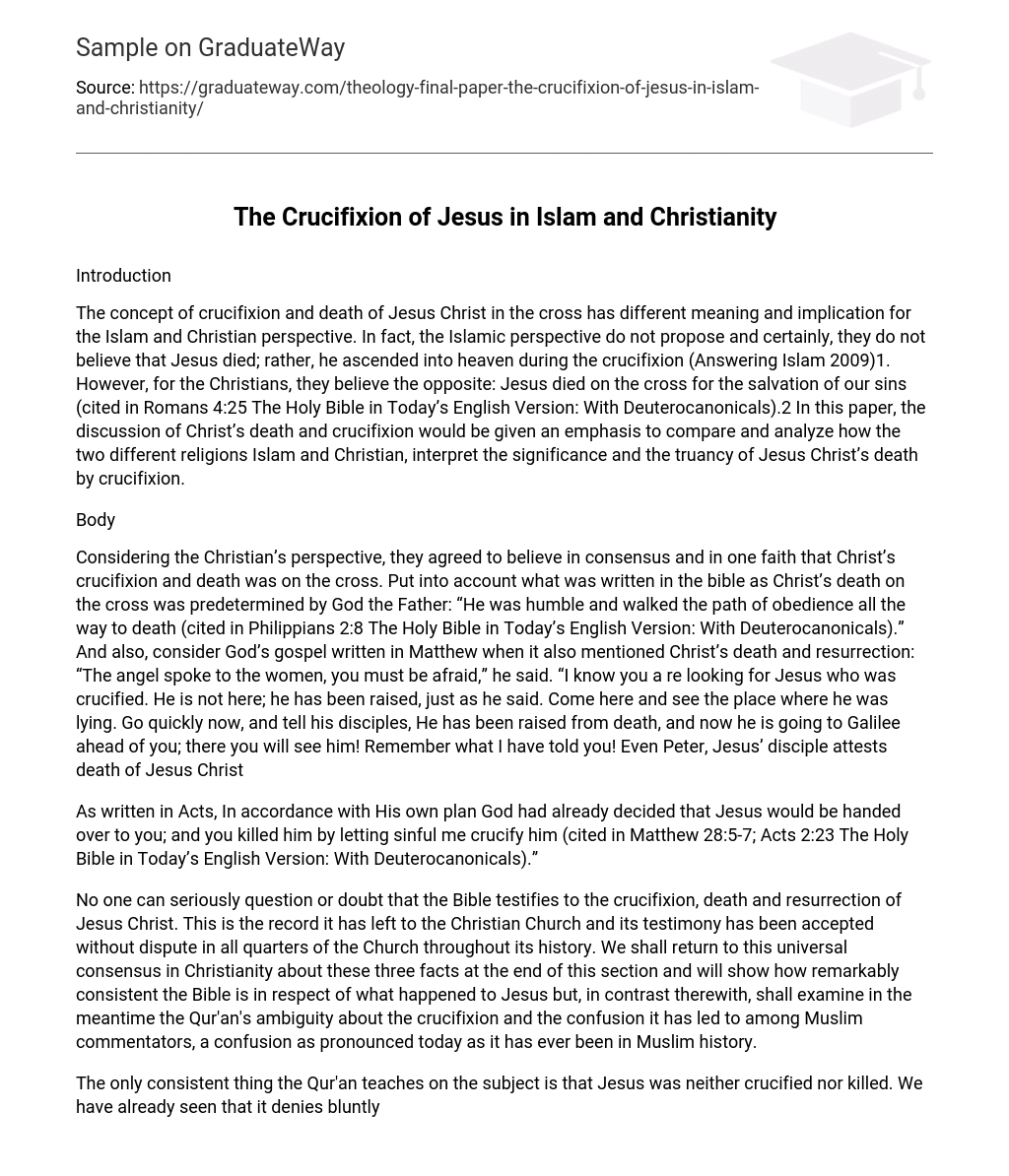Introduction
The concept of crucifixion and death of Jesus Christ in the cross has different meaning and implication for the Islam and Christian perspective. In fact, the Islamic perspective do not propose and certainly, they do not believe that Jesus died; rather, he ascended into heaven during the crucifixion (Answering Islam 2009)1. However, for the Christians, they believe the opposite: Jesus died on the cross for the salvation of our sins (cited in Romans 4:25 The Holy Bible in Today’s English Version: With Deuterocanonicals).2 In this paper, the discussion of Christ’s death and crucifixion would be given an emphasis to compare and analyze how the two different religions Islam and Christian, interpret the significance and the truancy of Jesus Christ’s death by crucifixion.
Body
Considering the Christian’s perspective, they agreed to believe in consensus and in one faith that Christ’s crucifixion and death was on the cross. Put into account what was written in the bible as Christ’s death on the cross was predetermined by God the Father: “He was humble and walked the path of obedience all the way to death (cited in Philippians 2:8 The Holy Bible in Today’s English Version: With Deuterocanonicals).” And also, consider God’s gospel written in Matthew when it also mentioned Christ’s death and resurrection: “The angel spoke to the women, you must be afraid,” he said. “I know you a re looking for Jesus who was crucified. He is not here; he has been raised, just as he said. Come here and see the place where he was lying. Go quickly now, and tell his disciples, He has been raised from death, and now he is going to Galilee ahead of you; there you will see him! Remember what I have told you! Even Peter, Jesus’ disciple attests death of Jesus Christ
As written in Acts, In accordance with His own plan God had already decided that Jesus would be handed over to you; and you killed him by letting sinful me crucify him (cited in Matthew 28:5-7; Acts 2:23 The Holy Bible in Today’s English Version: With Deuterocanonicals).”
No one can seriously question or doubt that the Bible testifies to the crucifixion, death and resurrection of Jesus Christ. This is the record it has left to the Christian Church and its testimony has been accepted without dispute in all quarters of the Church throughout its history. We shall return to this universal consensus in Christianity about these three facts at the end of this section and will show how remarkably consistent the Bible is in respect of what happened to Jesus but, in contrast therewith, shall examine in the meantime the Qur’an’s ambiguity about the crucifixion and the confusion it has led to among Muslim commentators, a confusion as pronounced today as it has ever been in Muslim history.
The only consistent thing the Qur’an teaches on the subject is that Jesus was neither crucified nor killed. We have already seen that it denies bluntly that Jesus was ever put on the cross, saying of him: “But they killed him not, nor crucified him, but so it was made to appear to them” (Surah 4.157), the Arabic original reading Wa maa qataluhuu wa maa salabuhuu wa laakin shubbiha lahum. The confusion arises over what actually happened to Jesus if he was not crucified. On this point the Qur’an is embarrassingly vague as we shall see, so vague that many Muslim theories nonetheless take in the actual crucifixion as a means to explaining the whole matter while denying his actual death on the cross. No matter how elliptically Muslims may argue around the event they nonetheless always fall back somehow on the only Qur’anic text dealing with the subject and will hold the actual Christian belief in the crucifixion and resurrection to be untenable.
Conclusion
I have purposefully left the whole subject of the crucifixion as a fact of history until the end of these three chapters on the most effective means of communicating the Gospel to Muslims so that it may obtain its proper place – a supporting proof for the message of the Gospel upon which it is based. The one cannot do without the other. Jesus called on all true believers to worship God in spirit and in truth (John 4.24) and no Christian witness will ultimately be effective unless it can combine these two essential ingredients – the spirit of the message of the Gospel and the factual truths on which it is based.
Works Cited
- “Answering Islam.org.” The Crucifixion in Islam and Christianity. Comparing Biblical and Qur’anic Tenets. 01 May 2009<http://www.answering-islam.org/Gilchrist/Vol2/6c.html>
- “The Holy Bible in Today’s English Version: With Deuterocanonicals.” USA: United Bible Societies, 1982.





